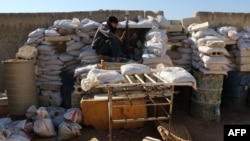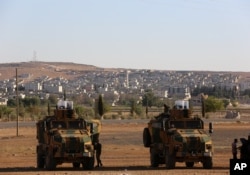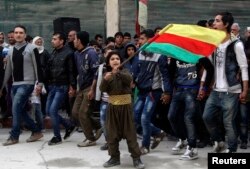Kurdish and Syrian rebels launched an offensive in late March to take back a small border region between Turkey and Syria that has become a key foothold for Islamic State militants. After weeks of fighting, local commanders say the operation is now intensifying.
The 98-kilometer-long border area in northern Aleppo is the only patch of land connecting IS-controlled Syrian territory to Turkey. It has been a funnel to transport the fighters and arms supplies to and from the defacto IS capital of Raqqa, Syria.
In recent weeks, Syrian rebels coming from the west have seized more than a dozen villages from IS. And Kurds, who are battling from the east, announced the establishment of a military council to push against IS.
"We established this military council to free Manbij and its surrounding areas from Daesh [Arabic for IS]," Ebu Leyla, a commander of the council, told VOA, referring to a border town. "We won't stop until we clear out the entire area from Daesh thugs."
IS fighters use the territory to fire off rockets almost daily into Turkish territory, and Ankara says it may seek more help from the U.S.-led coalition to seal the border and rid the area of IS fighters. The U.S. has been in discussion with Kurdish and Turkish officials over how to uproot IS there, according to local commanders who spoke with VOA.
In a telephone call Monday with U.S. President Barack Obama, Russian President Vladimir Putin urged the closure of the border from where "fighters and arms supplies for the extremists make their way in," the Kremlin said in a written statement.
Turkey began tightening control over the border late last year, with the Western coalition's help. That has slowed the tide of refugees and the flow of IS militants and arms. Now there is a new push to crack down on the border, and Ankara says it wants the final say in what happens there.
"Only Turkey has the right to make decisions about its borders," Turkish Prime Minister Ahmet Davutoğlu said Monday.
Future control of area
The Islamic State forces who hold the territory are battling Kurdish and Syrian rebel forces on two fronts. The Kurdish forces are opposed by Turkey but backed by the United States. On the other front, Syrian rebels — who are also backed by the U.S. — are fighting IS.
But this means that if IS is eventually ousted, the U.S.-backed operation could result in an extended dispute over who controls the area, experts say.
The advances are welcomed by the U.S., which has recently intensified its efforts to further isolate IS in Iraq and Syria. U.S. aerial support to both Syrian Kurds and the rebels has been critical in their advances, analysts say.
As they move toward closing the IS corridor to Turkey, the rebels and the Kurds are also fighting one another over control of that strategic border area known as "Manbij pocket."
"It is an absolute mess there," a U.S. official who wished to remain anonymous told VOA recently. “There are so many competing parties. It's really difficult to tell you what the ground realty is."
Kurdish forces, Turkish threat
Turkey supports the advances of the Syrian rebels, but considers the movement of the Kurds toward the border a red line.
The dominant Kurdish force in the area is called People's Protection Units (YPG), which is seen by Turkey as a threat to its own national security because of its close ties to Turkey's separatist group, the Kurdistan Workers Party (PKK).
"YPG is following its own agenda in Syria and is blocking the political process. YPG also poses a direct threat to the border security of Turkey," a senior official at Turkey's Ministry of Foreign Affairs told VOA.
The U.S. does not share Turkey's position on the YPG, and considers the group its most effective ground force ally in fighting IS on the Syrian border.
"For the U.S., the priority is to seal that Turkish border stretch with IS no matter who does it," Aydin Selcen, the former Turkish consul general in northern Iraq, told VOA.
"For Turkey, the priority is to stop PKK-affiliated Kurds no matter what it takes," he said.
Selcen said the U.S. is trying to placate all parties so that Turkish concerns are addressed, and Kurdish and Syrian forces are supported in their advances against IS.
Pentagon officials would not comment on the situation.
"The U.S. must and will accommodate Ankara's wishes to be able to assert influence on Syria from the north, while entertaining communication with — and offering some sort of support to — YPG as they are the single [most] successful element … against IS," Selcen said.






